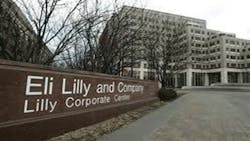Eli Lilly Expands Insulin Manufacturing Due to Growing US Demand
Eli Lilly and Co. (IW 500/50) last week announced a $140 million expansion to the company's Indianapolis insulin manufacturing operations. The 80,000-square-foot expansion, which will enable the manufacturing of insulin cartridges to meet the growing diabetes demand in the U.S., represents “one of the most significant investments in Lilly's U.S.-based manufacturing operations in the past decade,” according to a company statement.
The plant which is expected to become operational in 2015, will employ more than100 specialized technicians, scientists, and engineers.
The Centers for Disease Control and Prevention predicts that as many as one in three U.S. adults could have diabetes by 2050. The rise in prevalence of the disease is due, in part, to an aging population more likely to develop type 2 diabetes, increases in minority populations that are at high risk for type 2 diabetes, and people with diabetes living longer. Diabetes afflicted 366 million people worldwide last year, according to the International Diabetes Federation.
"Lilly is committed to providing a full range of innovative treatment options for people with diabetes," said John C. Lechleiter, Ph.D., Lilly's CEO. "The need in our country is great — and it is growing. This investment will help us to better meet that need while expanding our advanced manufacturing footprint in our home state — helping to strengthen Indiana's bioscience industry."
Lechleiter said the new facility will manufacture insulin cartridges for people with diabetes. It will be a first-of-its-kind facility for Lilly in the U.S.
Lilly's reorganization of its diabetes operations almost three years ago has provided greater focus on its innovation-based product portfolio and pipeline of potential new medicines. Today, the company has 10 potential new diabetes medicines in various stages of clinical development including oral medications, insulins, and a once-a-week treatment to meet the needs of people with diabetes.
Lilly's $140 million expansion is one of the largest economic development investments in both the city and state in 2012.
"Lilly's expansion brings new jobs and investment of new capital to our local economy, demonstrating the company's confidence in doing business in Indianapolis and strengthening our advanced manufacturing and bioscience industries," said Indianapolis Mayor Greg Ballard.
